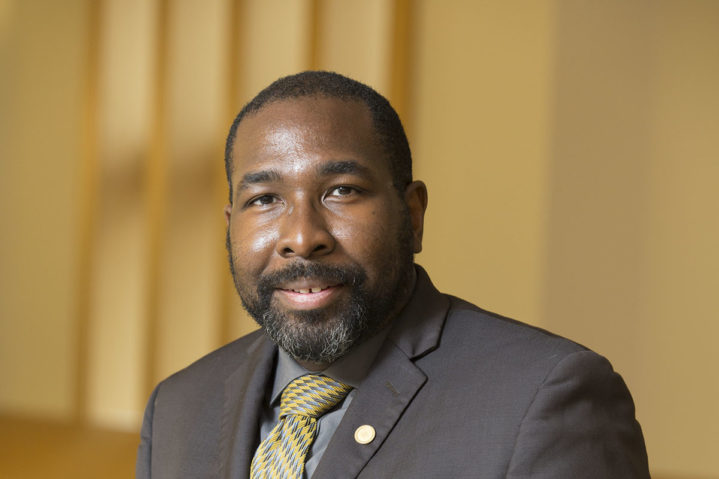
Presented by Washington University in St. Louis (WUSTL) for
The Importance of Place: Wash U’s Dedric Carter on What it Takes to Build a Strong Ecosystem
“How do you build an entrepreneurial ecosystem? How do you build the necessary resources?”
This was a question posed by Dr. Dedric Carter, associate provost and associate vice chancellor for innovation and entrepreneurship at Washington University during a recent gathering of his CSE 507A: Technology Entrepreneurship class in the School of Engineering & Applied Science.

Dedric Carter, PhD is the associate provost and associate vice chancellor for innovation and entrepreneurship at Washington University in St. Louis. He was also recently named vice chancellor for operations and technology transfer. Photo by Whitney Curtis/WUSTL Photos
On this particular day, he’d gathered a panel of local entrepreneurship experts: Dennis Lower, president & CEO at Cortex Innovation Community, Ginger Imster, executive director at Arch Grants, Travis Sheridan, executive director at Venture Café, and Dougan Sherwood, co-founder and managing director at CIC – St. Louis, to discuss how to build a successful entrepreneurial ecosystem.
During the discussion, “The Importance of Place,” an entrepreneurial concept Carter has championed, was stressed: What elements are needed? How can a region achieve growth and success? Throughout the class discussion and in an interview with EQ, Carter broke down the elements he values as vital to a healthy startup ecosystem:
Density that allows for interaction
“Entrepreneurs need the spontaneous collisions and serendipitous interactions that force them out of the planned path that they have and to think about things in a different, broader way,” says Carter. “The more they see through that prism, the more they have the chance of getting it right. Entrepreneurship is about being able to harness that energy. For example, at Venture Café, you bump into say, a filmmaker, who says, ‘In film this is what we do.’ That interaction may help you polish your venture. It shows the importance of a density of interaction that can help grow the perspective on the venture.”
A supportive environment
“Entrepreneurship is a lonely sport. There have to be people willing to take the call or meeting, to open the door and to provide some feedback off the clock,” says Carter.
“It has to be friendly to family—to kids, but also to people that build their families by stitching together bands of brothers and sisters who allow individuals to be who they are. This family means they have a support network, not just a cheering squad. I always worry when I see just cheering squads. Growing up in my family, we celebrated each others’ achievements around the dinner table, but also took each other to task. The humility that happens when there is a set of people to whom you are accountable is very important.”
“There has to be a place that is open to work and interact—such as CIC. There should be inviting construction and lighting in the facility that allows for the fluid movement of people. An open door policy is critical for asking for, providing and receiving mentoring.”
Existence Proofs
“Existence proofs that are celebrated and visible are critical. The more people are seen doing it, the easier it is to imagine doing it,” Carter says.
As an illustration of this concept, at the end of the class, Carter asked the panel what the most important metric is for them to determine success. Each entrepreneur had a different answer: Lower said revenue and Sheridan said NPS (Net Promoter Score), which measures loyalty. Sherwood stressed the importance of genuineness in relationship building and Imster said, “Every day I begin and end the day really asking myself, ‘How close are we to that vision? Is St. Louis becoming the model for how to leverage entrepreneurship and philanthropy?’ And that involves so many different metrics that we are watching on a daily, weekly, quarterly, monthly basis but it all comes back to that central question which is very reflective of our mission.”
An affordable community
“Venture capital is, of course, helpful. But the place also has to be affordable, where it is possible to work for equity,” Carter says. The lower cost of living in St. Louis compared to New York, Silicon Valley and even Chicago makes the typically meager income of entrepreneurs manageable.
During the panel discussion, panelist Lower emphasized that when CIC, headquartered in Cambridge, Massachusetts, began making plans to expand, its original plan was to go bigger—to San Francisco, New York and even Tokyo. “We learned that there is an incredible cost to going into those markets,” said Lower. “Have any of you looked at rents in San Francisco? We would have had to change the investment structure of our company to move into any of those markets.”
A clunky, funky spirit
“A good place for entrepreneurship is willing to go against the grain a bit, to challenge the way things are always done. It can be a microbrewery-type space or an artist area. It doesn’t have to be prim and proper and buttoned up. These are the districts that allow off-the-beaten path pioneering,” Carter says.
For more of Carter’s thoughts on entrepreneurship in St. Louis, read our interview with him from EQ’s Issue 1. For more stories of innovation and entrepreneurship at Washington University in St. Louis, be sure to check out WashU Fuse.